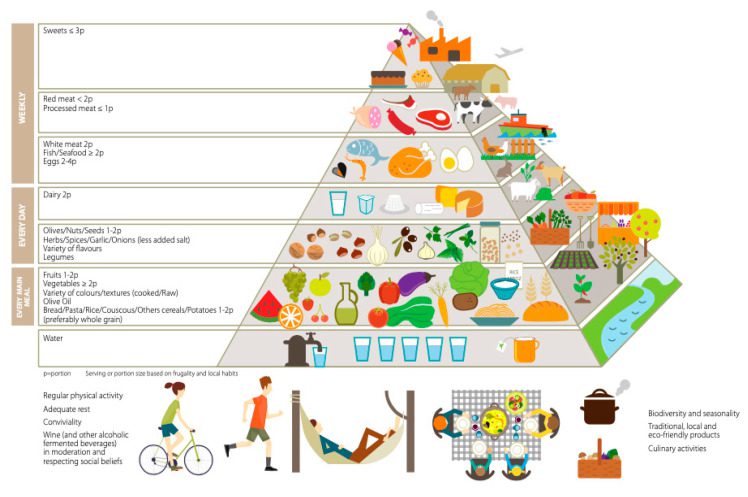The Mediterranean Diet (MD) is considered to be one of the healthiest dietary approaches. Thanks to a combination of foods rich mainly in antioxidants and anti-inflammatory nutrients.
Most modern chronic diseases are driven by inflammation, and the MD is considered the anti-inflammatory diet of choice.
The term Mediterranean diet was coined by Ancel Keys in the 1960s, based on his observations of the eating habits and lifestyle of the people living near the Mediterranean Sea. He noticed specifically a reduced incidence of chronic diseases and improved longevity when compared to other regions of the world.
The MD focuses, for the most part, on the local, fresh, whole, and nutrient-dense seasonal foods that maximize the content of protective nutrients and substances in the diet.
It is characterized by higher consumption of plant foods – grains/cereals (mostly whole), fruits, vegetables, legumes, tree nuts, seeds, and olives- with olive oil as the principal source of added fat, along with high to moderate intakes of fish and seafood, moderate consumption of eggs, poultry, and dairy products (cheese and yoghurt), low consumption of red meat and sweets, and a moderate intake of wine during meals.
Two further typical aspects of a Mediterranean lifestyle include daily physical activity and adequate hydration.
The Mediterranean Diet is generally lower in calories, sodium, refined grains, processed foods, and added sugars, compared to the Standard American Diet (SAD) and other western-type diets.
The Mediterranean diet includes all food groups and a wide variety of foods, minimizing the possibility of deficiency of a particular nutrient. In fact, a higher adherence to the MD has been associated with a better nutrient profile, with a lower prevalence of people showing inadequate intake of micronutrients in comparison to other dietary models such as SAD.
The beneficial effects of the Mediterranean diet are mostly due to the combination of antioxidant elements, fiber, and the inclusion of health-promoting mono- and polyunsaturated fats.
The Mediterranean Diet Pyramid
At the base, one finds food items that should be consumed in high proportions and frequency and that sustain the diet and provide the highest energy intake.
These are foods of plant origin for the most part and provide key nutrients, fibre, and protective substances that contribute to general well-being, satiety, and the maintenance of a balanced diet.
The main meals contain three basic elements: cereals/whole grains, vegetables (2 or more servings/meal), and fruits (1-2 servings/meal), with proteins of plant or animal origin. In addition, a daily intake of 1.5–2 L of water alongside wine and other fermented beverages that are consumed during meals.
Olive oil is located at the centre of the pyramid; olives, nuts, and seeds, spices, herbs, garlic, and onions are a good way to introduce a variety of textures, flavors, and palatability to dishes without recurring to excessive salt or artificial flavors to increase the palatability of foods.
Traditional Mediterranean dishes do not usually have animal-origin protein foods as the main ingredient but rather as a source of flavor.
At the upper levels, there are foods to be eaten in moderation. Those include foods rich in sugars and animal fats and are left for special occasions.
The Mediterranean Diet
- has been used as a tool to control cardiovascular risk factors such as high cholesterol and hypertension
- the diet has been linked to lower inflammatory biomarkers
- has a protective role for cardiovascular and cerebrovascular events (such as heart disease or stroke).
- the Mediterranean diet has been used as a therapeutic approach to manage atherosclerosis, obesity, type 2 diabetes, metabolic syndrome, cancer, or neurodegenerative diseases such as Alzheimer’s and Parkinson’s diseases.
- is a protective factor against the development of various types of cancer,
- lowers the incidence of chronic diseases, helps to maintain a healthy weight, and improves longevity
- has been used as an effective tool for maintaining an optimal healthy weight
Benefits of The Mediterranean Diet
- Diet is considered one of the most important environmental factors contributing to overall health and the development of chronic degenerative diseases.
- Low-grade chronic inflammation has been the hallmark linking metabolic dysfunction to tissue damage and increased risk of developing chronic degenerative conditions such as diabetes, obesity, cardiovascular diseases, and cerebrovascular events such as stroke.
- Most nutrients found in abundance in the Mediterranean diet have known antioxidant, anti-cancer, anti-inflammatory, and anti-obesity properties that contribute to the maintenance of optimal health.
Other highlights of the MD include:
- Serving sizes, which are generally smaller and based on moderation.
- Meals are a place of relaxation and social interactions that add value to foods beyond their nutritional content.
- Daily moderate physical activity (at least 30min throughout the day) helps to maintain a healthy weight and provides additional health benefits.
- Physical activities include everyday-like activities such as walking, cooking, housework, and gardening, and more organized events such as football, dancing, jogging, and cycling.
- Resting during the day (nap) as well as adequate night sleep is also part of the Mediterranean lifestyle. Scientific evidence has shown that a short rest after eating is a healthy habit that helps promote a balanced lifestyle.



